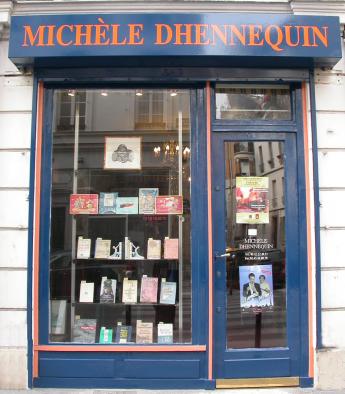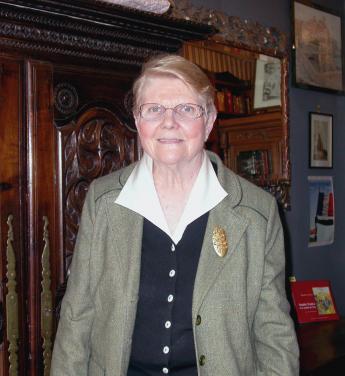Actualités Syndicat National de la Librairie Ancienne et Moderne Librairie Michèle Dhennequin
Michèle Dhennequin

Michèle Dhennequin
An interview by Neveen Marchiset
1. When did you start working in the antiquarian book business ?
I started working in the antiquarian book business in 1969.
2. How did you become involved in the business?
By chance. I had been a new book dealer since 1958, and one day, a runner dropped by with a collection of second hand travel books which seemed interesting, it was a subject I had always been attracted to. This was the beginning.
3. Was it difficult for a woman as a rare book dealer? Or better: what were the difficulties for a woman in the rare book business during the 1960s and 1970s?
When I started, very few women were book dealers and the Gentlemen of the Trade, the majority of which became friends, told me ironically: “You want to do a man’s job, you will not last” (they used cruder words which I cannot repeat!) I was helped by many factors. The first was that I had been familiar with old books since I was five years old as my father used to take me with him to the banks of the Seine to visit the book dealers. Another factor were the business studies I had followed at University and the diploma I received, of which I’m very proud and … although it unfortunately no longer exists, I followed initiation classes at the House of the Book Trade. I learnt everything: formats, paper, bindings and also how to do a search in a bibliography. Bibliographies were “paper books” then. After so many years practising our trade, I still study bibliographies even if I own over sixty thousand descriptions of books which passed through my bookshop. (Yes! I have kept them all;) which in my speciality represent an important documentation even if incomplete, as we keep on learning, day after day.
4. Has it changed since then?
Nowadays, many more women work in the trade, and it’s a good thing.
5. What are your major activities? Are you specialised?
When I started, I opened my bookshop from Monday to Saturday, from 9 am to 8 pm. I started from scratch, built my business through hard work, and even if I’m not one of the “High End” dealers, I’m proud of what I’ve achieved because, in my field, I believe I have become a reference. Everything interests me in the business, and even if I can forget the name or the face of someone, I never forget a book which I’ve seen only once. My speciality: The past French colonies and overseas territories. The idea of this speciality came to me because my first bookshop was situated near the Lourcine Casern where many colonial regiments were stationed and one day, an Officer asked me to find him a specific antiquarian book on Madagascar…

6. Do you remember the most extraordinary book you ever sold or bought?
I remember perfectly well the most extraordinary book I ever bought. It is the FLACOURT – History of the Great Isle of Madagascar, dated 1661. One day, I received the catalogue of a colleague where this book was described. I sent my husband to see the book, and surprise, the bookseller tells him: “It has the coat of arms of the Dhennequins”! My husband called me and I told him, of course, buy it! It did not, however, have the “coat of arms of the Dhennequins” but had the book plate of my family, and has since then become the masterpiece of my own collection. This story is about a book which has a personal meaning for me. However, concerning the books I bought for sale, notwithstanding the more ancient books in my speciality I had several times, I particularly remember buying a collection of letters sent by Abd El Kader to General Daumas in 1850; an important archive belonging to Law of Lauriston, General Commander of the French Establishments in India; a nice set of works printed in the language of the Marquises Islands (1857–1860); a photo album of General Gallieni in Madagascar, along with other rare photo albums (Martinique, Tahiti); without forgetting to mention the collections of the past governors of the colonies.
7. Do you remember the day you first opened? And you first catalogue?
Yes! I opened my bookshop on 1st April 1969 (what an April Fool!), and I cannot bear to part with it. I published my first catalogue that same year.
8. Did you participate in book fairs?
I participated in numerous book fairs, in particular at the Conciergerie, the Mutualité and of course at the Maison de la Radio in Paris, and also in the Parc Brassens to sell inexpensive books that I had bought in numbers.
9. Are there any particular moments in your career you can tell us about?
There have been many particular moments in my career, but the one which made the biggest impression on me was when I attended a session at the Assemblée Nationale. I was the only person on the first floor, and a woman! The heads of the congressmen looked at me wondering who the hell I was. I was also invited to the Elysée Palace for a 14th July, the French National Day. And French Television did a film about the history of my bookshop and the books on the French Indies.
10. Were your family, your colleagues or your friends helpful?
My family was very helpful, and my first husband insisted that I set up my own business. My colleagues also helped me by giving me addresses or books on consignment. But only those of my generation did, because nowadays, it is every man for himself, and that’s quite a pity.
11. Do you have favourite customers?
I don’t have any favourite customer, I like all my customers and I believe that the opposite is true (or almost true). I am proud, however, to have received in my bookshop customers such as President Senghor, Houphouët Boigny, Aimé Césaire and many others.
12. You have been working as a rare book dealer for more than 50 years. Some people say that the business has radically changed during that period. What do you think?
The business has changed a lot: money is too dominant, which wasn’t the case when I started. I am an expert in my field, and I know that prices cannot be stretched like they are now. Customers who pay too much will never recover their money unless the books they have bought have something special to account for the high price, such as unique copies or books with extraordinary inscriptions. Furthermore, books are becoming scarcer: either families decide to keep them (at least the better ones), or they are sold at auction at outrageous prices; many have been sold abroad and will never come back.
13. In two sentences, what is most important for a good rare bookseller?
Finding rare items and having customers who are interested in buying them.
14. What do you think about the future of the rare book business in general?
I don’t want to sound pessimistic and say that the rare book business is dying, but I would love it if the younger generation was more interested in books, even if it’s difficult to put sixteenth century books on a design shelf.
I also believe that the Internet has done a lot of harm to the REAL BOOKSELLERS who, as a colleague of mine says, sell “books made of paper”
Librairie Michèle Dhennequin
Voyages and travel - Topography (Asia, Africa, West Indies, Australasia)
76, Rue du Cherche-Midi
Paris (France)
Phone: 01 42 22 18 53
Open Tuesday to Friday 2 pm to 6 pm
